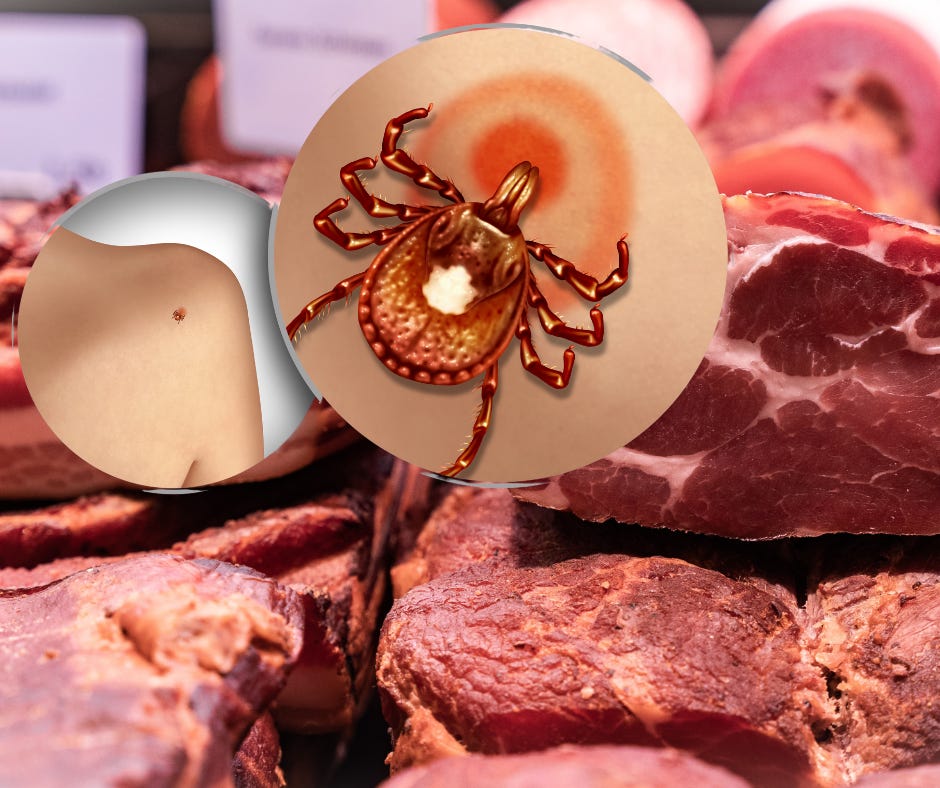
As summer approaches, outdoor enthusiasts and anyone spending time in nature should be aware of a growing health concern: the Lone Star Tick. The Centers for Disease Control and Prevention (CDC) has issued warnings about this tick species, which is becoming increasingly active during the warmer months. Not only are tick bites a general health hazard, but the Lone Star Tick, in particular, has a unique and troubling potential to cause meat allergies.
‘‘Red meat isn’t one of the top eight major food allergens, and an allergy to this food is a rather new discovery. But it’s on the rise.’’
In this article, we take a closer look at the CDC's warning about the Lone Star Tick. Learn about the associated risks, symptoms of Alpha-Gal Syndrome (a meat allergy), and preventive measures to protect yourself and enjoy outdoor activities safely.
Understanding Alpha-gal Syndrome (AGS)
Alpha-gal Syndrome (AGS) is an allergic reaction to red meat and other mammalian products triggered by a bite from the Lone Star Tick. This allergy can be severe and even life-threatening, causing symptoms like hives, nausea, vomiting, and trouble breathing after consuming meat.
Trigger: A bite from the Lone Star Tick
Symptoms: Hives, nausea, vomiting, difficulty breathing after consuming meat
The Lone Star Tick, identifiable by a single white spot on the back of adult females, is found in the Eastern, southeastern, and south-central United States. The tick transmits a sugar molecule called alpha-galactose (alpha-gal) through its saliva, which can trigger the allergic reaction in some individuals.
Expert Insights
According to Dr. Johanna Salzer, an expert at the CDC, AGS is becoming increasingly common within the range of the Lone Star Tick. However, a previous CDC report also identified a few cases outside this typical geographic area, suggesting the need for further investigation.
Prevention and Awareness
Here's how to protect yourself:
Avoid tick bites, especially when spending time outdoors in areas where Lone Star Ticks are prevalent. Wear long pants and long sleeves and use insect repellent containing DEET or permethrin.
Conduct regular tick checks after being outdoors. Remove any attached ticks with fine-tipped tweezers and dispose of them properly.
Be aware of the symptoms of AGS, such as hives, swelling, nausea, and difficulty breathing after consuming meat. Seek immediate medical attention if you experience these symptoms.
By staying informed and taking preventive measures, you can significantly reduce your risk of tick bites and AGS. Remember, awareness is key during the summer months when tick activity is at its peak. Protect yourself and enjoy the outdoors safely!
Source:
Centers for Disease Control and Prevention (CDC) About Alpha-gal Syndrome
Visit Our Amazon Store!
Notice: As an Amazon Associate, we earn a commission from qualifying purchases that help promote animal rights worldwide!
General Resources
Books:
Dominion: The Power of Animals in Nature and in Our Imagination by Matthew Scully
Animal Liberation by Peter Singer
Eating Animals by Jonathan Safran Foer
A Billion Hungry Mouths: Feeding the World Without Consuming the Planet by Colin Tudge
Websites and organizations:
Documentaries:
Articles:
"The Case for Animal Rights" by Tom Regan
‘‘Why We Love Dogs, Eat Pigs, and Wear Cows: An Introduction to Carnism’’ by Melanie Joy
‘‘Animal Rights: The Abolitionist Approach’’ by Gary L. Francione
‘‘Fellow Creatures: Our Obligations to the Other Animals’’ by Christine Korsgaard
Seeds of Compassion: Finding Jesus Christ in a Vegan World by Michael Corthell
Receive a single informative article daily at 12:01 AM by email. Explore my homepage with exciting vegan and plant-based news content and delightful and delicious recipes for additional updates. Stay connected to the vegan world and all it has to offer.
Visit The Vegan Project Global our Facebook page for more vegan outreach and education.
Also, visit our new YouTube channel
The information on this vegan/plant-based blog is for general informational purposes only. It is not intended as legal, medical, or professional advice. Readers should consult with appropriate professionals for specific advice tailored to their situation. The blog owner is not responsible for any reliance on the information herein.




